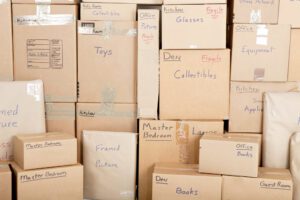
The Ultimate Moving Checklist for 2024
Embarking on a move, whether across town or the country, presents a myriad of tasks that, if not properly managed, can transform an exciting transition into an overwhelming ordeal. As we approach 2024, staying organized and ahead of the curve is more crucial than ever. This comprehensive moving checklist will guide you through every step of your journey, ensuring a smooth and stress-free experience. From initial planning phases to the final touches in your new space, every aspect is covered. Particularly, we’ll delve into the importance of hiring professional movers for both local and nationwide moves, highlighting why this choice can be pivotal in the success of your relocation.
Moving to a new home is an adventure—a chance to start fresh and create new memories. Yet, without the right planning and preparation, this adventure can quickly become daunting. As we move into 2024, with its unique challenges and opportunities, having a robust moving checklist is indispensable. This ultimate guide aims to equip you with all the necessary tools and knowledge, ensuring your move is as seamless and efficient as possible.
Eight Weeks Before the Move
Start Planning Early
- Create a Moving Binder: Keep all your moving-related documents, contracts, and checklists in one place.
- Budget for Moving Expenses: Consider all potential costs, including packing supplies, professional movers, and travel expenses.
- Research Moving Companies: Start looking into moving services for both local and nationwide moves. Gather quotes and read reviews to find the best fit for your needs.
Six Weeks Before the Move
Declutter and Organize
- Sort Your Belongings: Decide what to keep, sell, donate, or discard. A lighter move can save time and money.
- Begin Collecting Packing Supplies: Obtain boxes, tape, bubble wrap, and markers for labeling.
- Notify Important Parties: Inform banks, employers, and subscription services of your impending change of address.
Four Weeks Before the Move
Begin Packing and Finalize Details
- Start Packing Non-Essentials: Begin with items you use less frequently.
- Choose Your Moving Company: Confirm arrangements with your selected movers, especially if planning a nationwide move where logistics can be more complex.
- Arrange Utilities: Schedule disconnection and reconnection dates for services like electricity, gas, and internet.

Two Weeks Before the Move
Confirm Moving Arrangements
- Confirm Details with Movers: Reconfirm the moving date, costs, and other specifics. Discuss protection measures for valuables and large furniture.
- Prepare an Essentials Box: Pack a box with items you’ll need immediately upon arrival, such as toiletries, medications, and a few days’ worth of clothing.
One Week Before the Move
Final Preparations
- Finish Packing: Label boxes by room and contents, marking items as “fragile” when necessary.
- Prepare Household Appliances: Defrost the freezer, drain gasoline from lawn equipment, and secure appliance doors.
- Plan for Moving Day: Ensure there’s a clear path for movers to navigate and protect floors and carpets as needed.
Moving Day
Oversee the Move
- Guide the Movers: Be available to answer questions and give directions for where items should be placed in your new home.
- Perform a Final Walkthrough: Check every room to ensure nothing is left behind.

Hiring Movers: Local vs. Nationwide Moves
When considering moving services, understanding the distinction between local and nationwide moves is vital. Local moves typically involve relocating within the same city or region. These moves can often be more flexible, with the option to make multiple trips if needed. Nationwide moves, however, require meticulous planning and coordination, as items must be transported long distances in one go.
The Importance of Professional Movers
- Expertise and Efficiency: Professional movers are trained to handle your belongings with care, ensuring everything arrives intact. Their experience speeds up the moving process, making it smoother and more efficient.
- Stress Reduction: By entrusting the heavy lifting and logistics to the experts, you’re free to focus on other aspects of your move, reducing overall stress.
- Customizable Services: Whether you’re moving locally or across the country, moving companies offer a range of services, from full-service packing and unpacking to transportation only. This flexibility allows you to choose the level of assistance that best suits your needs.
Unpacking and Settling In
Making Your New House a Home
- Unpack Strategically: Start with your essentials box, followed by the kitchen and bedrooms. Take your time to organize as you go.
- Explore Your New Neighborhood: Get to know your surroundings and introduce yourself to neighbors.
- Celebrate Your New Beginning: Host a housewarming party or a quiet dinner to mark the start of this exciting chapter.
Moving, whether locally or nationwide, is a significant life event that, with the right preparation, can be a positive and rewarding experience. This ultimate moving checklist for 2024 provides a detailed roadmap to navigate the complexities of relocating, emphasizing the pivotal role of professional movers in ensuring a successful move. By starting early, staying organized, and choosing the right moving company, you can look forward to a smooth transition into your new home and the adventures that await.

Leveraging Technology for a Smoother Move
In 2024, technology offers unprecedented support in organizing and streamlining the moving process. Here are a few tech tips to consider:
- Moving Apps: Utilize mobile apps designed for moving, which can help you create inventories, manage tasks, and even visualize furniture placement through augmented reality.
- Digital Inventory: Create a digital inventory of your belongings. This can be invaluable for tracking items throughout the move and useful for insurance purposes.
- Smart Home Setup: If moving into a smart home, plan the setup of your devices in advance. Consider the layout and connectivity needs to ensure a seamless integration.
Understanding Moving Insurance
Moving insurance provides peace of mind, but understanding your options is crucial:
- Full Value Protection: This insurance covers the replacement value of lost or damaged goods but comes at a higher premium.
- Released Value Protection: Often included at no additional cost, this offers minimal protection based on weight, not the item’s value.
- Third-Party Insurance: For high-value items, consider purchasing additional insurance from a third party for more comprehensive coverage.
Staying Organized Post-Move
Once the boxes are in your new home, staying organized can help you unpack and settle in more efficiently:
- Unpack by Room: Focus on one room at a time, starting with the essentials like the kitchen and bedrooms.
- Use a Labeling System: Having boxes labeled by room and contents speeds up the unpacking process and reduces confusion.
- Keep a List of Tasks: Post-move tasks can pile up. Keep a running list of administrative tasks, from updating your address to registering for local services, and tackle them systematically.
Building a Support Network in Your New Location
Moving to a new area means building new connections. Here are ways to start:
- Local Social Media Groups: Join local community groups on social media platforms to get tips, ask for recommendations, and meet neighbors.
- Community Centers and Local Events: Participate in activities or classes at community centers or libraries. Attend local events to meet people and learn about your new area.
- Volunteer: Volunteering for local causes or organizations is a great way to meet people with similar interests while giving back to your new community.

Eco-Friendly Disposal of Packing Materials
Once you’ve unpacked, consider environmentally friendly ways to dispose of or reuse packing materials:
- Recycle Cardboard Boxes: Break down cardboard boxes for recycling. Some moving companies offer box return programs.
- Donate Packing Supplies: Offer gently used packing supplies like bubble wrap and packing peanuts to local moving companies or post them on community boards for others to use.
- Creative Reuse: Look for creative ways to reuse materials. For example, packing paper can be used for art projects, and boxes can be repurposed for storage.
Reflecting on Your Move
After settling in, take time to reflect on your moving experience:
- Journal About the Experience: Documenting your move can provide valuable insights and help you appreciate the journey.
- Share Your Story: Consider sharing your moving experience, tips, and lessons learned with others facing similar transitions, whether through a blog, social media, or community groups.
As we’ve explored, moving in 2024 involves much more than just transporting belongings from one place to another. It’s about leveraging technology, understanding the nuances of moving insurance, staying organized, building new connections, and being mindful of the environment. By embracing these additional tips and considerations, you’re not just making a move—you’re paving the way for a successful new chapter in your life. Remember, each step you take in planning and executing your move is a building block for your future in your new home and community.
Leave a Reply